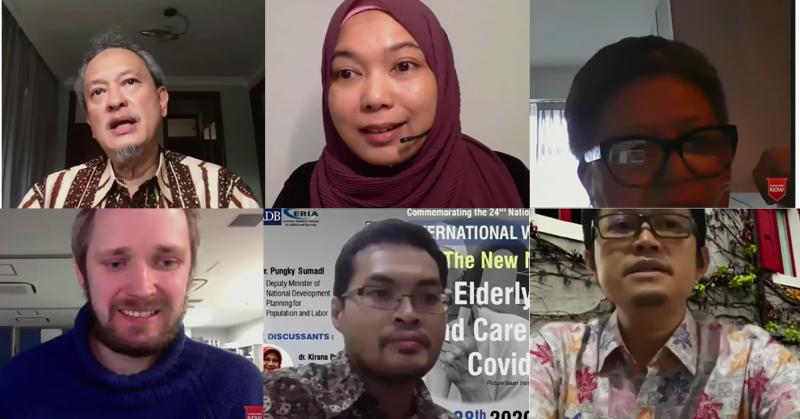The New Normal: Elderly Life and Care Post COVID-19

Jakarta, 28 May 2020: The Economic Research Institute for ASEAN and East Asia (ERIA), in partnership with the Indonesian Ministry of National Development Planning (Bappenas) and the Asian Development Bank (ADB) hosted an international webinar on ‘The New Normal: Elderly Life and Care Post COVID-19.’ The event was held to celebrate Indonesia’s National Day for Older People on 29 May 2020. Although Indonesia is well-known for its young population, based on the national definition, the country has now officially entered ageing population. Therefore, the recent COVID-19 pandemic has put a particular focus on the country’s senior citizens which makes up 9.4% of the population or around 26 million people in 2019, according to Dr Pungky Sumadi, the Deputy Minister of Bappenas for Population and Labour.
In his Opening Remark, Dr Sumadi mentioned how the pandemic has increased physical and mental health risks among Indonesia’s older people, including the risk of depression and loneliness. Indonesia’s imposed social restrictions due to the Covid-19 pandemic have caused economic repercussions and the government has provided various social assistance programs to the vulnerable and impacted population. However, older people’s access to social protection programs has been limited in general. For instance, recently, only 10.5% of older people have pension coverage, while a more significant proportion of older population are engaged in the informal sector without social insurance coverage. Nevertheless, the Indonesian government has sought to expand social assistance programs, increase benefits as well as expand the coverage. In 2019, about 25% of older population received regular social transfers from the government.
As Indonesia prepares to exit the social restrictions phase and enter the ‘new normal’, there are significant challenges and questions on how it will impact older people’s life and care. The international webinar included a panel discussion to exchange ideas and insights in addressing the new normal from the perspectives and experiences of Japan, Malaysia, Singapore, and Indonesia.
Dr Andrei Akhmentzhanov from the National COVID-19 Cluster Taskforce at the Ministry of Health, Labour, and Welfare in Japan reported their results of the analysis in Japanese COVID-19 cases. They detected super-spreading cases and found the characteristics of the places where super-spreading events took place; the places which fulfilled all the ‘Three Cs’, those are Closed spaces, Crowded places, Close-contact settings. Avoiding ‘3Cs’ places, for example, night clubs or gyms, is one of the main strategies in Japan to control the spreading of COVID-19. He also said no clusters have been reported from public transport. Lastly, he talked about what the life of ‘New Normal’ is like and concluded that common prevention measures should be taken across generations, considering the remaining uncertainties on COVID-19.
Sharing her views, Dr Rahimah Ibrahim,Associate Professor and Deputy Director of the Malaysian Research Institute on Ageing (MyAgeing), Universiti Putra Malaysia called for more infection control training, business continuity, and aged-care industry reform post-COVID-19.
Ms Peh Kim Choo, Chief Executive Officer of the Tsao Foundation – Singapore, believed that it is up to stakeholders to create and define the new normal. Going forward, Ms. Kim Choo stressed the importance of working in teams, using technology as a tool to assist older people, engaging the community as care volunteers, and redesigning a more efficient work process.
Dr Dinar Kharisma, Policy Planner at Bappenas, addressed Indonesia’s fragmented care system for older people and the government’s plan to integrate the programs. He then conveyed how technology can aid in targeting the most vulnerable senior citizens so they can receive the right assistance. Dr Kharisma introduced ‘SILANI’, the Elderly Information System, which is Bappenas’ pilot project aimed at gathering data about Indonesia’s older people and linking the country’s elderly care providers. SILANI aims to support Indonesia’s ‘New Normal’ in providing care for older people by assuring their wellbeing while limiting unnecessary physical interactions.
For Indonesia, knowing the problems affecting its older population is key to succeeding in the new normal particularly because 41% of the national COVID-19 deaths are the elderly, as mentioned by Dr Kirana Pritasari, the Director General of Public Health at Indonesia’s Ministry of Health. Unique to Indonesia, Dr Pritasari shared that 80% of Indonesia’s older people live with families. Therefore, maximising the roles of family and community is key for elderly care during the pandemic. Dr Adhi Santika, Former Member of the National Council of Elderly 2008-2014 and Program Consultant of Muhammadiyah Senior Care, echoed similar views and called for the development of support systems for older people.
However, Dr Dinar Kharisma of Bappenas raised a point on the opposing effects the role of families can have on older people’s wellbeing. While social isolation is a growing problem among older people during the pandemic, being with family members can also trigger mental health problems resulting from stress over finances, hardships faced by a family member, and intrusion of personal space. Guidance from the government designed for older people living with families is another important approach to protecting older people’s wellbeing in the new normal.
The complexity of the new normal for Indonesia’s older population also serves as an opportune time for Indonesia to learn from the experiences of Japan, Malaysia, and Singapore as stated by Dr Kharisma. In doing so, Dr Kharisma hopes that once Indonesia’s older people care system expands, its strategies would be aligned to that of its Asia Pacific partners.
The COVID-19 pandemic has required changes in the approach to life and care for older populations, but the international webinar demonstrated the preparedness of regional stakeholders to undertake this important task. In his closing remarks, Dr Maliki, the Director of Poverty Alleviation and Social Welfare at Bappenas expected that by combining inclusive social protection programs, community support, accurate data, and technological innovation, stakeholders of older people care can succeed in the new normal. To close the webinar event, Dr Maliki expressed his hope that the current progress and future international collaboration can ensure Indonesia’s older people can live a more comfortable, dignified, and healthier life.
Source: https://www.eria.org/news-and-views/the-new-normal-elderly-life-and-care-post-covid-19/